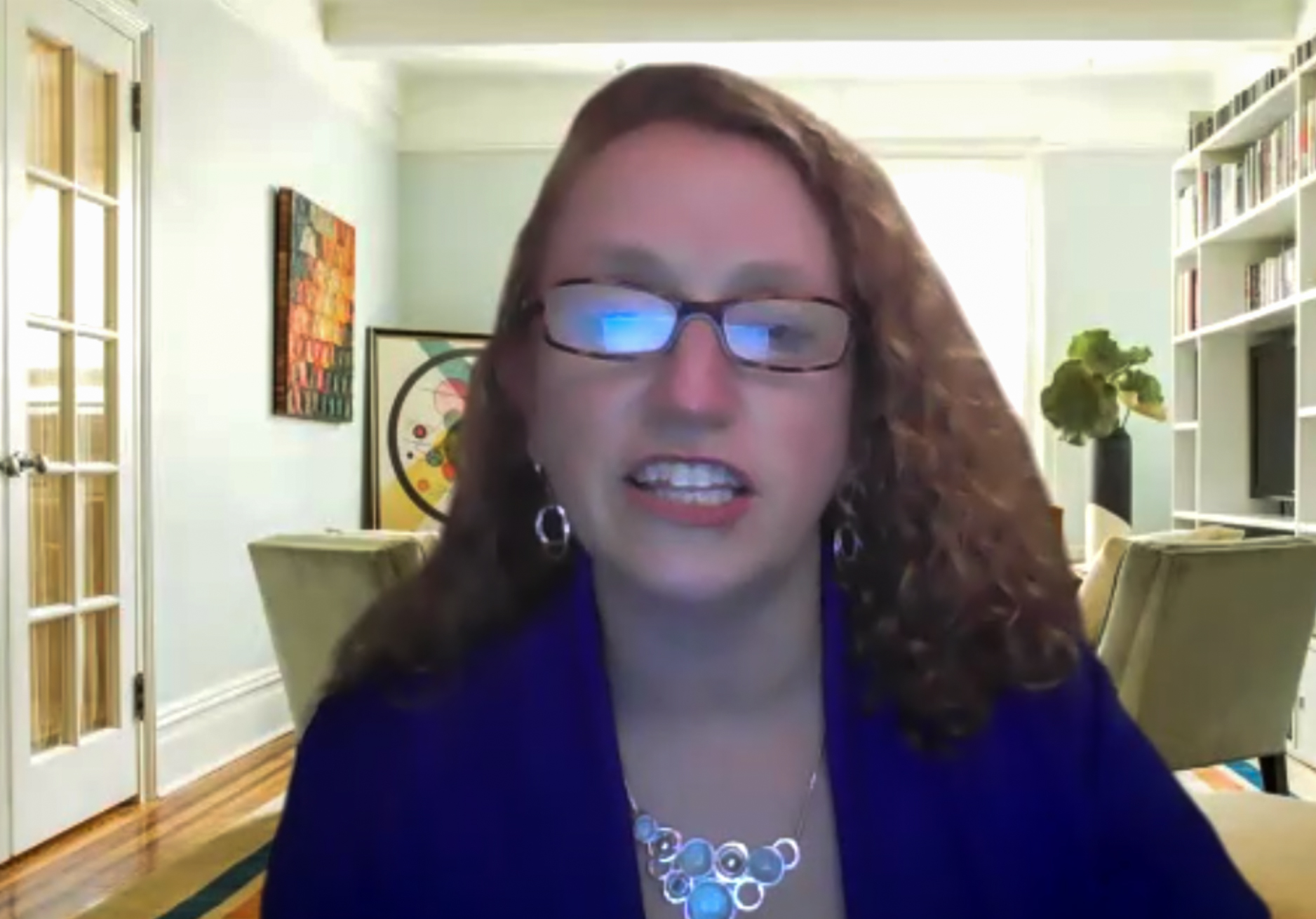Suzanne Nossel brings conversation on free speech and misinformation to College’s democracy series
March 5, 2021
 Mackey O'Keefe
Mackey O'KeefeSuzanne Nossel, free speech advocate and Chief Executive Officer of PEN America, a nationwide organization that strives to protect free expression, virtually visited Bowdoin on Monday evening to participate in the College’s “After the Insurrection: Conversations on Democracy” series that explores the current state and future of the country’s democracy.
Nossel delivered a talk on the role of free speech in society and the danger of misinformation in a question-and-answer session moderated by New York Times reporter Katie Benner ’99.
While some attendees had little prior knowledge of the progression of the misinformation movement, others, such as Calvin Kinghorn ’21, were already somewhat informed and were hoping for discussion with other interested individuals. Kinghorn said that he had listened to a number of podcasts about free speech in his free time.
“[The talk] seemed like an alignment of things I had already been looking into, and I was hoping that other Bowdoin students would think about the same things and that I would be able to connect with them,” Kinghorn said in a Zoom interview with the Orient. “I wanted to hear a different perspective on the same issues that I had been researching.”
Nossel was specifically hoping to reach college-aged students during her talk. She wanted to speak to people who have grown up in the digital age—a time when misinformation is spreading faster than ever and free speech is often misused in harmful ways.
“For young people growing up in the Trump era and leading or participating in protests, these questions [regarding free speech] are at the forefront of their minds, and it creates a lot of conflict and tension,” Nossel said in a Zoom interview with the Orient. “In the long term, the rising generation is going to determine how, as a society, we end up navigating these issues, so I think it’s important to talk to them about these issues.”
As Nossel highlighted during her talk, she believes that the path to a democracy that prioritizes truth and inclusivity requires a more formal education on misinformation.
“I don’t think our goal should be to reduce misinformation to zero; I just think we need to equip our population to navigate information that moves faster and requires a more discerning eye,” Nossel said. “Just as we teach children in school to analyze a poem, we should be instructing them on how to navigate the online world and how to assess whether a source of online information is credible or not.”
Nossel said that skepticism towards online information is more important now than ever because social media platforms are not impartial. She argued that they are programmed to feature and promote posts that encourage maximum user engagement, which are usually the most controversial but not the ones that are the most true.
“It turns out that, very often, the most provocative content is false. It’s something that fuels hatred of a political or social antagonist or idea,” Nossel said during the Q&A session. “The types of information that thrive and propagate online can be truly corrosive to our discourse, and the content that has the greatest propensity to travel the furthest is often dangerous.”
Nossel also explained how Donald Trump’s 2020 presidential campaign furthered this algorithmic-driven propulsion of false information. Due to the overwhelming power and influence that he possessed on social media platforms such as Twitter, his outlandish and lewd claims often spread faster and were believed by more users than scientific or political facts.
“The spread of misinformation is not a new phenomenon … but Trump has really been the ‘Propagator in Chief,’” Nossel said in an interview with the Orient. “He was the original source of a great deal of the country’s dangerous and false claims that call into question the science of COVID-19 prevention or the results of the 2020 presidential election.”
However, Nossel remains optimistic for the future and encourages young people to be advocates and take action.
“We all have a stake in free speech protection,” Nossel said during the Q&A session. “Regardless of the type of justice that you’re seeking, you have a stake in being able to express yourself, voice your opinions, publish articles, protest and make movements.”
Kinghorn noted the low turnout at Nossel’s talk and expressed his wish that students would take advantage of the series to engage with these issues.
“I’m just looking forward to the next [talk],” Kinghorn said. “I know I was one of the only students who attended this one, so I just hope we can get more students to come to them.”
The next event in the College’s series, on March 11, is titled “Democracy, Voting Rights and Elections” and will feature Director of the Brennan Center’s Voting Rights and Election Program Myrna Pérez.

Comments
Before submitting a comment, please review our comment policy. Some key points from the policy: